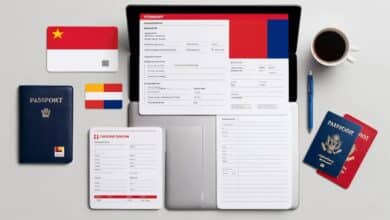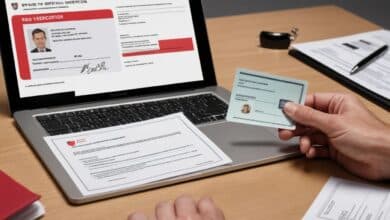How to Apply for a Sponsored Visa in Berlin, Germany: Benefits and Full Process
Berlin’s employment landscape attracts global professionals with its simplified approach to work authorization.
Unlike systems requiring employer-funded sponsorship, Germany operates on a merit-based model. Qualified candidates with job offers can independently apply for permits, bypassing complex financial commitments from companies.
This process eliminates lottery systems common elsewhere. Employers often assist by providing documentation or partnering with relocation agencies. For South Africans, this creates accessible pathways to Europe’s stable job market without bureaucratic hurdles.
Key advantages include faster processing and reduced employer dependency. Professionals gain access to competitive salaries and Berlin’s thriving tech and creative sectors. Many firms streamline paperwork, ensuring smooth transitions from offer letters to permit approvals.
Understanding these distinctions helps applicants prepare effectively. Focus shifts to securing employment and gathering required proof of qualifications. With proper guidance, navigating Germany’s requirements becomes straightforward for motivated candidates.
Understanding Visa Sponsorship in Berlin
For skilled workers, securing authorization to work here hinges on qualifications rather than employer-funded processes. This system prioritizes individual merit over corporate sponsorship, creating opportunities for professionals to independently manage their relocation journey.
Core Advantages for Professionals
The primary benefit lies in predictable timelines. Applicants avoid lottery systems common in countries like the U.S., where H1B visas depend on random selection. Instead, valid job contracts and certified skills form the basis for approval.
Employers face fewer administrative tasks compared to traditional models. They provide essential documents like employment letters but avoid financial obligations tied to sponsorship programs. This efficiency attracts companies seeking global talent without legal complexities.
Contrasting Global Systems
Unlike systems requiring proof of local hiring failures, Germany’s approach values specialized expertise. A software developer from Cape Town with relevant experience could secure approval faster than through conventional sponsorship routes.
The model also supports long-term planning. Successful applicants gain access to residency pathways after 4 years of regulated employment. This stability contrasts with temporary permits common in other nations, where renewal uncertainties persist.
Navigating the Application Process for Sponsored Visas
The pathway to employment authorization in Germany’s capital involves three critical phases. Professionals must first secure a qualifying position before assembling necessary paperwork. Timing and attention to detail prove vital throughout these stages.
Securing a Job and Work Contract Requirements
A valid employment contract forms the foundation of the process. Employers typically outline:
- Salary meeting German standards
- Detailed job responsibilities
- Employment duration aligned with permit types
Highly skilled candidates should explore the EU Blue Card option. This route demands academic credentials and salaries exceeding €45,300 annually (€39,693 for tech roles).
Preparing and Submitting Essential Documentation
Applicants gather these core materials:
- Certified educational certificates
- Proof of housing arrangements
- Valid health insurance coverage
South African professionals often require additional steps like police clearance certificates. Processing timelines vary between 6-12 weeks, emphasizing early preparation. Many employers assist with embassy appointments and document verification to accelerate approvals.
Employment Opportunities and Additional Considerations
Germany’s capital attracts professionals through dynamic career paths across multiple sectors. Tech startups, healthcare providers, and financial institutions lead hiring efforts for international talent. English remains the primary working language in many organizations, removing language barriers for global applicants.
Exploring Jobs and Remote Work Options
Key industries offering roles include:
- Software development and IT services
- Biotechnology and medical research
- Renewable energy engineering
Hybrid work models now dominate 63% of professional positions. This flexibility allows candidates to begin employment remotely while completing relocation arrangements. Companies often adjust start dates to accommodate permit processing timelines.
Salary, Taxes, and Company Support
Compensation packages vary by field and experience. Senior tech roles typically offer €65,000-€85,000 annually, including:
- Health insurance contributions
- Retirement savings plans
- Professional development budgets
Tax rates range from 14-45% based on income brackets. Employers frequently provide tax consultation services and housing assistance. Manager-level positions often include family visa support and expedited residency applications.
Conclusion
Germany’s capital provides a structured framework for professionals seeking European career growth. The streamlined authorization process reduces administrative burdens through employer collaboration and merit-based evaluations. South African candidates benefit from transparent timelines and direct access to roles in high-demand sectors.
Thorough preparation remains critical for success. Applicants should prioritize verifying qualifications and understanding regional employment standards. Strategic job searches aligned with local market demands increase approval chances for work permits.
Ongoing developments in hiring practices continue enhancing opportunities for global talent. Competitive salaries and employer-supported relocation packages make this city appealing for long-term career planning. With proper documentation and awareness of requirements, professionals can efficiently navigate this pathway to international experience.
For more information, explore the official visa website mentioned in this article:
You will be redirected to another website
FAQ
What advantages do employers offer through work authorization support?
Employers often streamline relocation by handling bureaucratic steps, providing legal guidance, and covering fees. Some companies also assist with housing or language courses to ease integration.
How does employer-backed immigration differ from standard employment permits?
Unlike standard permits, this model requires companies to prove they couldn’t fill roles locally. They must also commit to fair wages and compliance with German labor laws throughout the hiring process.
What documents are mandatory for securing a work contract in Germany?
Applicants typically need a valid passport, recognized qualifications, a signed job offer, and proof of health insurance. Roles in regulated professions may require additional certifications or translations.
Can remote positions qualify for employer-supported residency permits?
Remote roles are possible if the employer operates legally in Germany. However, hybrid arrangements or local client interactions often strengthen applications compared to fully remote setups.
How do salary thresholds impact eligibility for skilled worker programs?
Earnings must meet or exceed industry averages for the role and region. Higher salaries may expedite approvals, while lower wages require justification through collective bargaining agreements.
What tax considerations exist for foreign professionals in Berlin?
Non-residents pay income tax on German-sourced earnings. Employers typically handle withholdings, but individuals must file annual returns and may qualify for expat-specific deductions.
How long does authorization typically take after submitting paperwork?
Processing averages 4-8 weeks for complete applications. Delays occur if documents need verification or during peak seasons. Premium services can accelerate certain cases.
Published on: 18 de July de 2025







